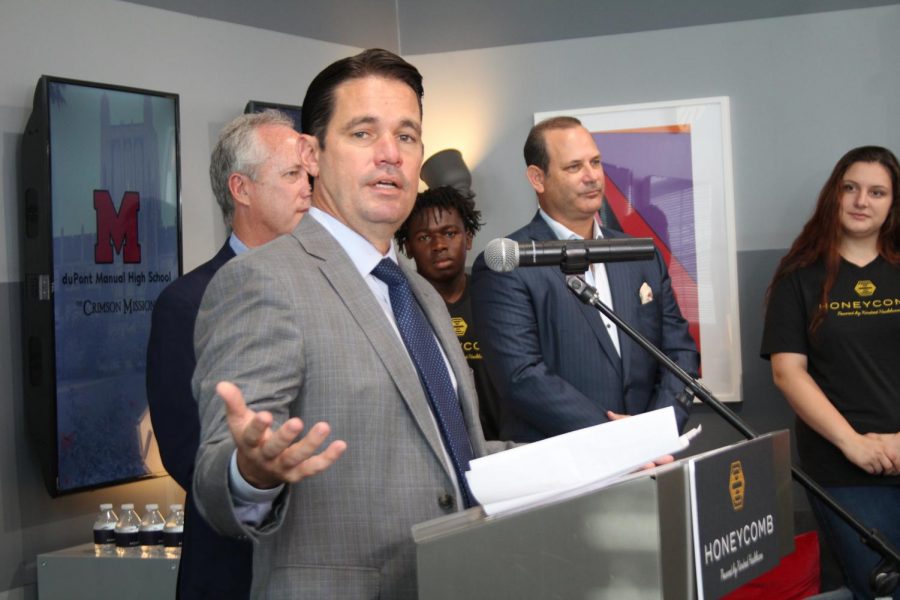Pollio: JCPS will only use NTI days as a last resort
March 16, 2020
In a document sent to all JCPS principals yesterday, Superintendent Marty Pollio outlined his argument against Non-Traditional Instructional (NTI) days and their use within the district while school is closed.
Specifically, he cited the lack of wireless internet access for many students, the necessity to provide Exceptional Child Education (ECE) services and the requirement for teachers to work during these days.
Pollio said the district submitted a “tentative application” for the use of NTI days to the Kentucky Department of Education (KDE) after they allowed for emergency applications to be submitted due to COVID-19. KDE approved the application, pending JCPS school board approval.
However, in the document, Pollio bolded his personal opinion and made it clear that he doesn’t see NTI days as equitable or effective.
“Although it may excuse some days from the calendar, I seriously question the ability of ALL students to participate in any NTI program and to properly be monitored for learning,” Pollio said. “I have spoken with superintendents from counties who have used NTI, and they reinforce this same thinking.”
JCPS faces several issues that other counties in the state do not, including at least 5% of students not having internet access at home and 62% of students qualifying for free or reduced-price meals.
“[W]e have so many students without access to Wi-Fi and devices. We are working with some community partners at this time to try and figure out a way to get free Wi-Fi for students and devices to those that need them,” Pollio said. “This is no small undertaking.”
A few days ago, Charter announced that they will offer free Spectrum broadband and wireless internet access for 60 days to households with “K-12 and/or college students who do not already have a Spectrum broadband subscription at any service level up to 100 Mbps.”
Charter to Offer Free Access to Spectrum Broadband and Wi-Fi For 60 Days For New K-12 and College Student Households and More https://t.co/afH8ZhhW5q via @charternewsroom
— Charter News (@CharterNewsroom) March 13, 2020
Charter also emphasized their willingness to partner with school districts “to ensure local communities are aware of these tools to help students learn remotely.” Additionally, their Wi-Fi hotspots will become public use.
While this seems to solve one of JCPS’ major issues, especially if the district were to partner with Charter, ECE services and teacher workdays are still issues the district must tackle.
“ECE services MUST be provided during NTI days. As you can imagine, the challenge in providing services to 13,000 ECE students for NTI will be immense,” Pollio said.
According to the district website, ECE services are provided “to students in both comprehensive and special education facilities, and a range of programs, techniques, methods, and materials is available for individualized instruction” as well as to students with learning, behavioral and physical disabilities.
Lastly, “teachers will have to work on NTI days and we are not able to bring teachers into our buildings at this time,” Pollio said.
At most JCPS schools, certain administrators and secretaries are the only people permitted in the building since they are scheduled to work per the Inclement Weather Plan, but even in those cases, Pollio said “we are highly encouraging employees to determine if their daily work can be accomplished remotely. On Monday, we’ll be prepared to give you further steps to request the option to telecommute.”
JCPS employees working at the VanHoose Education Center are already telecommuting, according to a response to an open records request Manual RedEye filed last week.
Some school districts across the country, especially those utilizing NTI days, expect teachers to work from home to provide instruction to students while in-person classes are canceled. That proves difficult in some cases where teachers might not be as technologically savvy as needed to adequately educate students or where free resources are difficult to find.
Non-Traditional Instructional days were first proposed in 2011 by Dr. Terry Holiday, former Commissioner of Education, who proposed a plan that “would allow school districts to continue to provide instruction to students when it was necessary for school to be canceled due to health or safety reasons.”
In the proposal, after cancelation and the utilization of NTI curriculum, districts would then submit evidence of student participation and learning to the Commissioner to consider approving those specialized school days as regular instructional days. If approved, the districts would not need to make missed days up.
In 2014, the program became full-time during the Regular Session of the Kentucky General Assembly. All 173 Kentucky school districts became eligible that year, however, only 83 participate as of 2020.
For now, Pollio said he has “no plans for us to use NTI days” and clarified that the district only submitted an application should the Kentucky Legislature not provide forgiveness days and school cancelation lasts into May. In that case, he said, NTI would be implemented in JCPS.









